When Alan Burns decided it was time to bring his boat home from France, the passage provided the best and worst sailing has to offer

It was time for a change. My wife Sheila and I wanted to return to our favourite sailing area on the Clyde, having enjoyed cruising in South Brittany since 2009. The mooring for our Bavaria 34 Saloma at Foleux was very economical but even so, the time and cost of getting to Brittany could not be justified for two three-week holidays each year. It was time to sail home.
Luckily, sailing friends Nigel and Sarah Robinson volunteered to accompany me for the first two weeks of the trip, as Sheila, who was supervising building work at home, was unable to join me. I reckoned two weeks would be plenty of time to sail to Saint-Malo, and visit many places I had never seen, before hopping across the Channel. It was also a convenient ferry port that my sons could arrive at, from where we could visit the Channel Islands followed by a crossing to Plymouth. They would then depart home to Liverpool and my other crew Peter and Glenn, who I had met in our local pub, would arrive from Yorkshire for the final leg north.
With provisioning done, we locked out of Foleux and decided to push on to Port Tudy on Île de Groix. After motor sailing initially, the wind filled in and we enjoyed a cracking reach, at times over seven knots, arriving off Port Tudy by 1730. The high point of our day was being passed by the Paprec racing trimaran, which was almost airborne.
At Le Guilvinec the surf on the rocks as we approached suggest that you may think twice about making this your landfall in heavy weather, but obviously the fishing fleet use it daily. The size and number of trawlers left a lasting impression as they are in such contrast to the decline of our fishing industry at home. From there, we passed the spectacular rocks of Pointe du Raz and through the Raz de Sein at low water and made for Camaret, where we refuelled before sailing on to L’Aber Wrac’h.
Denne historien er fra September 2017-utgaven av Yachting Monthly.
Start din 7-dagers gratis prøveperiode på Magzter GOLD for å få tilgang til tusenvis av utvalgte premiumhistorier og 9000+ magasiner og aviser.
Allerede abonnent ? Logg på
Denne historien er fra September 2017-utgaven av Yachting Monthly.
Start din 7-dagers gratis prøveperiode på Magzter GOLD for å få tilgang til tusenvis av utvalgte premiumhistorier og 9000+ magasiner og aviser.
Allerede abonnent? Logg på

Midsummer on Hanö
This wonderful little island in the south-east of Sweden is a real gem off the beaten track
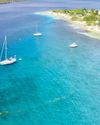
ADVENTURE SAILING TO HAITI
After spending two months in the Dominican Republic, Andy Brown sails west to Haïti bringing medical and school supplies to the town of Mole Saint Nicholas
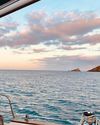
In celebration of bad sailing
New owner Monty Halls tests his sailing skills with his family aboard their Colvic 34 ketch, Sobek. A recently qualified Day Skipper, Monty faces a few unexpected challenges...

Winter brings excitement and opportunity
Oddity’s double glazing, insulation and heating create a warm, homely environment as I bash out this column.
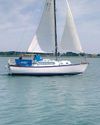
ADVENTURE MAISIE GOES TO GOES
To depart or not to depart? That is the question. Is it safer to stay, or suffer the wind and weather of a rough North Sea?
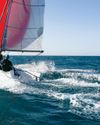
'MAYDAY, GRANDAD OVERBOARD!'
When David Richards and his grandson Henry went out racing from lowey, they didn't expect their sail to end with a lifeboat rescue
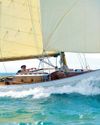
VERTUE
For a 25-footer, the Vertue has a huge reputation and has conquered every ocean. So what makes this little boat quite such an enduring success? Nic Compton finds out
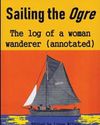
Sailing siblings
Mabel Stock, her brother Ralph, a friend Steve and an unnamed paying passenger passed through the Panama Canal in December 1919 on the sturdy Norwegian cutter Ogre. They were towed to a quiet anchorage in Balboa away from the boat traffic but within rowing distance of the shore.
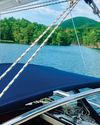
TECHNICAL MAINSAIL MODIFICATIONS
Safety and performance improved hugely when Mike Reynolds reduced the size of his mainsail and re-configured the systems controlling it
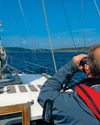
PILOTAGE DONE PROPERLY
Chartplotters are an amazing aid, but can detract from your real-world pilotage if not used with caution, says Justin Morton